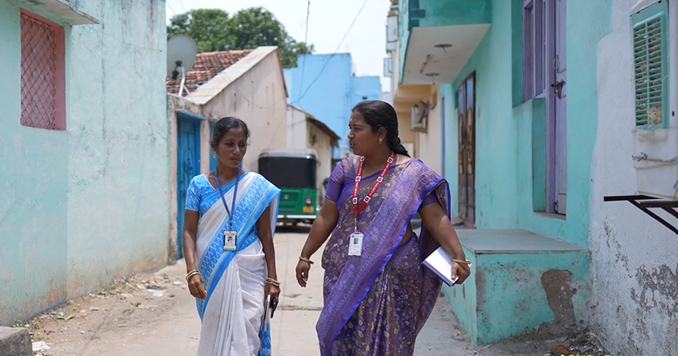Tuberculosis (TB) is a persistent public health challenge in India; the country accounts for 28 percent of the global TB burden. The risk of TB transmission poses a particular challenge in urban poor community environments, where overcrowding, poor sanitation, inadequate nutrition, and limited access to health care services elevate the risk of TB infection by nearly five-fold. Reaching people in these communities requires fit-for-purpose solutions that are responsive to community needs and preferences.
Some of the best resources to combat TB can be found within communities themselves. In India, there are multiple frontline health care worker (FLHCW) cadres who are trusted by the community and well-positioned to provide care and referrals. These include Community Health Officers, Auxiliary Nurse Midwives, Accredited Social Health Activists (ASHAs), informal providers, and private-sector pharmacists. In some areas in India, FLHCWs serve as the initial point of care for roughly two-thirds of individuals with TB symptoms.
Additionally, vulnerable youth aged 18–34 represent an important group who can contribute to TB prevention and care. They account for 27 percent of India’s population, but bear 38 percent of the TB burden. Youth have enormous potential and energy to engage their communities and influence their peers. In one survey, nearly one-third of youth respondents said they were interested in volunteering in TB prevention activities.
Both FLHCWs and youth, however, frequently lack knowledge about TB and the specific actions they can take to connect people to care and combat TB stigma. This can limit the potential of both groups to impact the TB epidemic.
In response, the “Take Charge Against TB” project was designed and implemented to achieve TB-free urban poor communities through the dual activation of FLHCWs and youth populations, who are well placed to raise TB awareness and link people with symptoms to care. This project, a public health initiative of Johnson & Johnson in collaboration with PATH and TB Alert India, and in strategic partnership with India’s National TB Elimination Programme, was implemented across the three cities of Delhi, Hyderabad, and Pune from January–June 2025.
The “Take Charge Against TB” goals were to strengthen health system capacity by upskilling FLHCWs to accelerate early diagnosis, and to improve health care seeking and linkage to care by mobilizing youth populations to support FLHCWs in these efforts.
